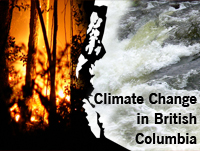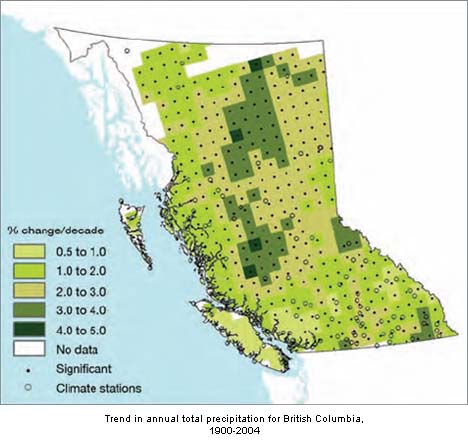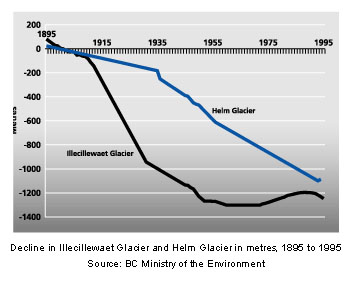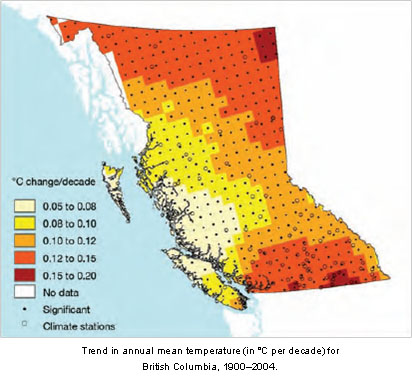Climate Change in BC -- Coming to Grips with Reality
 Vancouver, Canada (GLOBE-Net) - A report quietly released last month by Natural Resources Canada noted that significant impacts of climate change were already evident in all parts of the country and that these growing and irreversible changes would have profound implications for our economy, our lifestyles and our ecosystems.
Vancouver, Canada (GLOBE-Net) - A report quietly released last month by Natural Resources Canada noted that significant impacts of climate change were already evident in all parts of the country and that these growing and irreversible changes would have profound implications for our economy, our lifestyles and our ecosystems.The report, From impacts to Adaptation: Canada in a Changing Climate, was several years in the making and was based on research conducted by 140 environmental experts. It stressed that climate change impacts at home and elsewhere in the world, would affect Canadian consumers, the competitiveness of Canadian industries, and our international development, aid and peace keeping activities.
It noted recent extreme weather events were harbingers of the vulnerability of Canadian communities and our critical infrastructure and that while our capacity to adapt to these changes is high, it is unevenly distributed across the country. It noted that resource-dependent and Aboriginal communities were particularly vulnerable.
This article is the first in a series on climate change impacts across Canada and the measures that are being taken to mitigate or adapt to these impacts. It examines the effects climate change will have on British Columbia’s environment and economy and assesses the policy and program measures that are being taken or that will become necessary in time to deal with them.
Climate Change in BC - Coming to Grips with Reality
British Columbia is particularly vulnerable to climate change due to the province’s dependency on water, its unique geography, and its biodiversity.
Water: BC accounts for a third of Canada’s surface water resources and the province’s agricultural, pulp and paper, fisheries, food processing, mining, hydro-electric chemical and petrochemical industries are all major users of groundwater.

Climate change is expected to cause severe water supply problems that will become evident initially during periods of peak demand, but which eventually will become lasting water shortages in many areas.
Smaller glaciers, declining snowpacks, increased water flows during winter months and earlier flood seasons will result in less water flowing during the summer months. Competition amongst water uses will increase across sectors such as energy, agriculture and fishing and will have likely implications not only in terms of our own economy, but also in terms of our trans-border energy supply commitments

Forestry: Things are not much better looking in the provincial forestry sector. British Columbia’s 62 million hectares of forest are enormously important to the province’s economy and offer a wide range of social, cultural, economic and biological values and services.
The age distribution of forests in BC is skewed toward older trees, resulting in increased sensitivity to disturbance by fire and pests. Climate change is considered a major contributing factor to increased forest fire activity and to outbreaks of the mountain pine beetle blight.
Climate change directly affects most tree species in BC’s forests, as optimum growth conditions for local populations can be relatively narrow and there will be increased competition from other species more suited to the new climatic realities.
Forestry operations will be impacted directly. Changes in productivity will affect, wood quality, wood volume and size of logs. Access to timber may be limited during both winter, because of warmer and wetter conditions, and summer, due to increased risks of fire.
Fisheries: BC’s fisheries and aquaculture sector had annual raw-harvest and processed wholesale values of $620 million and $1.1 billion respectively in 2004. Climate change is already taking a toll on the industry. Economic losses to the commercial sockeye fishery alone were estimated at $72 million in 2002, and are expected to grow in coming years.

Future impacts could include invasion of coastal waters by exotic species; rising ocean and freshwater temperatures; and changes in the amount, timing and temperature of river flows. In freshwater ecosystems, climate change is already affecting the quantity (lake levels and river flows) and quality (temperature and nutrient levels) of seasonal and annual water supplies, disrupting life histories and reproduction of resident and migratory fish.
Tourism and Recreation: Tourism is BC’s second largest economic sector next to forestry, generating approximately $6.2 billion in 2005 according to the BC Government’s latest Tourism Industry Monitor Annual 2006.
The effects of climate change on tourism destinations are already evident. In BC’s southern interior, drought and forest fires during 2003 closed major transportation routes and destroyed orchard and winery crops. Rises in snowlines due to warming temperatures will impact ski operations across the province. Inadequate snowfall will reduce the number of suitable skiing days available to local resorts.
Tourism in coastal communities will be affected by sea-level rises and increased coastal erosion and flooding hazards. Associated impacts on transportation infrastructure, marina maintenance and dredging activities, boating safety, floatplane travel, vacation housing and resort infrastructure can be expected.
Parks and Protected Areas: British Columbia has the highest biodiversity of any province and hosts some of Canada’s most vulnerable and fragmented ecosystems. There are 859 protected areas in BC, accounting for more than 13% of the provincial landscape.
Tourism, traditional Aboriginal resource use, park operations and research are the main human activities in BC’s parks. Key climate change risks to be managed in the park system include:
- Alpine and sub-alpine ecosystem decline and fragmentation due to increased temperatures;
- Increasing impacts from natural hazards (avalanches, wind storms, storm surges, droughts and landslides) as a result of increased frequency and/or magnitude of extreme weather
- Species migration, extirpation and increasing exotic species competition, impacting biodiversity and population sustainability for both terrestrial and marine species.
Energy: Hydroelectric power generation, which accounts for approximately 90% of BC’s power supply, is particularly vulnerable to climate change, especially in dry summer, peak energy periods. British Columbia’s main hydroelectric generation reservoirs depend on water flows mainly from snow pack and/or glacial melt, all of which will be diminished from climate change.
Agriculture: Climate change is expected to have both positive and negative impacts on BC’s agricultural industry. According to the BC Ministry of Agriculture and Lands, 60% of the food needs of British Columbians are produced locally.
Longer growing seasons and milder winters are expected to increase the range of crop types suitable for economic production but will also increase the chance of severe droughts. Increased summer and winter temperatures may also result in new agricultural pests and diseases.
Adaptation plans in BC
The report is clear that climate change is all ready taking a toll on economic staples of BC and things are likely to get worse without action.
Measures are being taken to incorporate climate change impacts into some official water management plans. Reservoir capacity upgrades and demand management initiatives are being planned in drought-prone areas such as the Okanagan, where restrictions on watering are now in place.
Alternative ‘clean’ sources of energy such as wind and solar power will be needed to meet increasing energy demands and to further reduce BC’s dependency on water resources and stress on natural fisheries. The BC Integrated Electricity Plan states that at least 50% of new power supply will come from such renewable sources by 2025. BC is also looking into new zero-emission coal-fired generating plants.
Specific adaptation measures being considered to protect natural fisheries include:
- Reducing harvest rates to provide conservation buffers;
- Reinforcing habitat protection and restoration measures to promote increased sustainability of capture fisheries;
- Increasing hatchery production of salmon to counter declining productive capacity in natural habitats;
- Licensing and regulating river systems; or
- Promoting accelerated development of aquaculture to meet market demands.
Despite emerging adaptation plans for BC’s water resources, the province is facing some logistical problems regarding its wilderness. According to a 2005 report, Implications of Climate Change in British Columbia’s Southern Interior Forests, produced by the Canadian Mountains Institute of Applied Ecology, the sheer size of the wilderness in British Columbia means that much of BC’s wildlife will have to adjust without human intervention.
Any adaptation plans are likely to be focused on the major commercial tree species and perhaps a few animal species, while the majority of forest plants and animals will have to adapt as best they can.
According to the report, both the tourism sector and agricultural require further adaptation planning. Both sectors are accustomed to dealing with uncertainty in weather, markets, pests and diseases, and potential income. However these are normally short term problems and may not offer any help when dealing with the long term ramifications of climate change.
BC’s agriculture, water, fisheries, forests, park lands, tourism and energy are all inherently linked by the impacts of climate change and thus solutions for one sector can likely be transferred to another. In order to progress the province’s adaptation strategies collaboration from a wide range of experts is required.
The province has already begun some level of collaboration through the formation of the Climate Action Secretariat, created in November of 2007. This nationally unique organization has brought together climate change experts from across Canada, many of which serve on the International Panel on Climate Change (IPCC).
The focus of the group is to develop greenhouse gas emission reduction strategies and climate change mitigation plans.
In January of 2008 the BC government also announced the creation of Pacific Institute for Climate Solutions, which will bring together top scientists, researchers, governments and the private sector to develop innovative climate change adaptation and mitigation solutions.
Through its actions to date, BC has shown that it is taking the threat of climate change seriously and is doing what it can to mitigate and adapt to its impacts.
Gordon Campbell in the 2007 speech from the Throne said: "If we fail to act aggressively and shoulder our responsibility, we know what our children can expect. Things we take for granted and that have taken millenia to evolve could be at risk and lost in the lifetimes of our children."
"In our view many of the impacts and changes described are already occurring or will occur regardless of measures taken today to reduce emissions. The development and implementation of both mitigation and adaptive strategies are therefore essential"
-The Globe Foundation
The BC chapter of the report can be found here.
The full report can be found here.
For More Information: Natural Resources Canada
You can return to the main Market News page, or press the Back button on your browser.

